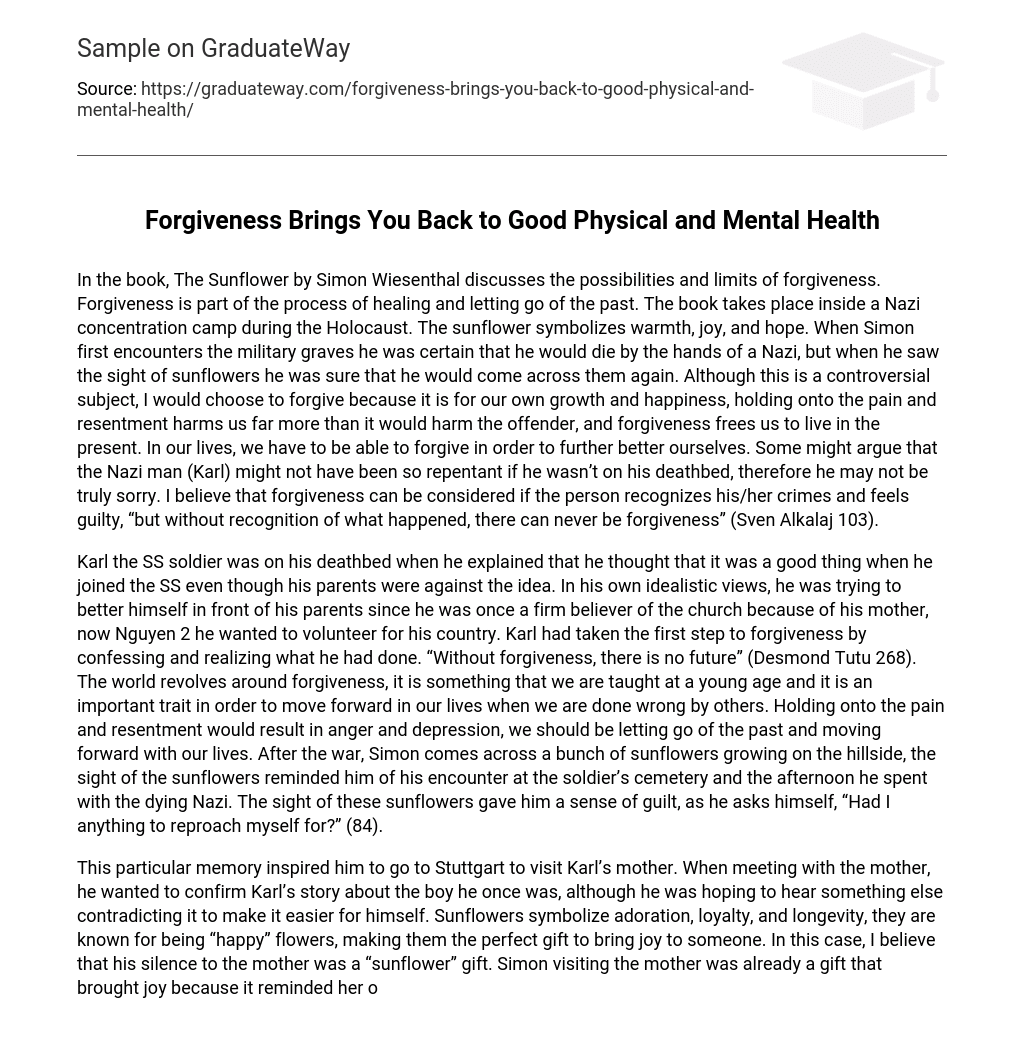In the book, The Sunflower by Simon Wiesenthal discusses the possibilities and limits of forgiveness. Forgiveness is part of the process of healing and letting go of the past. The book takes place inside a Nazi concentration camp during the Holocaust. The sunflower symbolizes warmth, joy, and hope. When Simon first encounters the military graves he was certain that he would die by the hands of a Nazi, but when he saw the sight of sunflowers he was sure that he would come across them again. Although this is a controversial subject, I would choose to forgive because it is for our own growth and happiness, holding onto the pain and resentment harms us far more than it would harm the offender, and forgiveness frees us to live in the present. In our lives, we have to be able to forgive in order to further better ourselves. Some might argue that the Nazi man (Karl) might not have been so repentant if he wasn’t on his deathbed, therefore he may not be truly sorry. I believe that forgiveness can be considered if the person recognizes his/her crimes and feels guilty, “but without recognition of what happened, there can never be forgiveness” (Sven Alkalaj 103).
Karl the SS soldier was on his deathbed when he explained that he thought that it was a good thing when he joined the SS even though his parents were against the idea. In his own idealistic views, he was trying to better himself in front of his parents since he was once a firm believer of the church because of his mother, now Nguyen 2 he wanted to volunteer for his country. Karl had taken the first step to forgiveness by confessing and realizing what he had done. “Without forgiveness, there is no future” (Desmond Tutu 268). The world revolves around forgiveness, it is something that we are taught at a young age and it is an important trait in order to move forward in our lives when we are done wrong by others. Holding onto the pain and resentment would result in anger and depression, we should be letting go of the past and moving forward with our lives. After the war, Simon comes across a bunch of sunflowers growing on the hillside, the sight of the sunflowers reminded him of his encounter at the soldier’s cemetery and the afternoon he spent with the dying Nazi. The sight of these sunflowers gave him a sense of guilt, as he asks himself, “Had I anything to reproach myself for?” (84).
This particular memory inspired him to go to Stuttgart to visit Karl’s mother. When meeting with the mother, he wanted to confirm Karl’s story about the boy he once was, although he was hoping to hear something else contradicting it to make it easier for himself. Sunflowers symbolize adoration, loyalty, and longevity, they are known for being “happy” flowers, making them the perfect gift to bring joy to someone. In this case, I believe that his silence to the mother was a “sunflower” gift. Simon visiting the mother was already a gift that brought joy because it reminded her of her late husband and late son. He notices that the house is worn out, she is an old lady that has no one but herself, and that he couldn’t bring himself to shatter the images of her late son’s memories. Simon then talks about the tragedies of the past and how today the world demands that we forgive and forget. Even though the Jews went through a very difficult and trying time, they’re expected to suffer in silence. Although he did stay silent when the Nazi soldier was asking for his forgiveness, he decided to stay silent to the Nguyen 3 mother rather than shattering her whole world. “Forgetting is something that time alone takes care of, but forgiveness is an act of volition, and only the sufferer is qualified to make the decision” (98). Forgiveness is a necessary tool in order to live in the present. For example, as a boyfriend and a friend, there are times where my relationships or friendships have been tested where I would either have to forgive or apologize in order to move forward. If I didn’t choose to forgive I would be reliving the past, thinking about the wrong that was done to me and it would keep me from enjoying life.
Forgiveness brings you back to good physical and mental health. The systems of the body respond to negative emotions, affecting the immune system in ways that could lead to depression. Releasing those emotions is a good idea. Also just like Simon Wiesenthal, once reminded of the sunflower field he remembered Karl and began to wondered if what he did to Karl was wrong and wanted closure. In order to receive closure, he chose to visit Karl’s mother and decide things for himself once and for all. Throughout our lives, we are faced with a number of situations and sometimes we have to dig a little deeper into our hearts and minds to find answers or solutions to these situations. The act of digging deeper sometimes has to start with forgiveness. In Simon Wisenthal’s book The Sunflower we read about Simons journey as a Jewish prisoner during one of history’s most trying events, The Holocaust. As he made this fateful encounter with the dying SS man (Karl) he is puzzled by what he should’ve done, to forgive or to not forgive. Choosing to forgive means one’s own growth and happiness, holding onto the pain and resentment harms us far more than it would harm the offender, and forgiveness frees us to live in the present.





